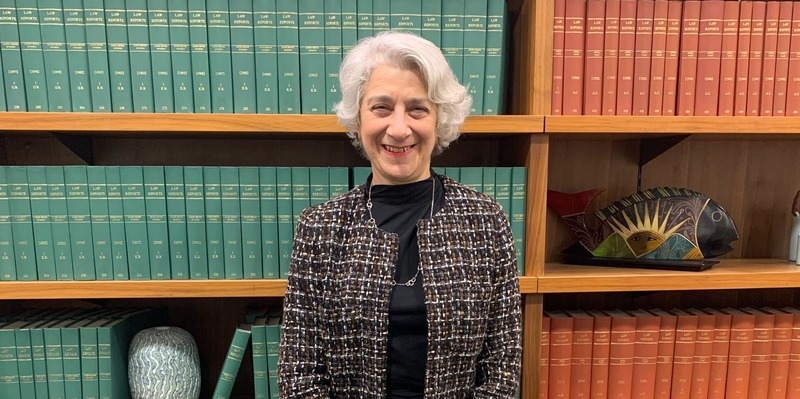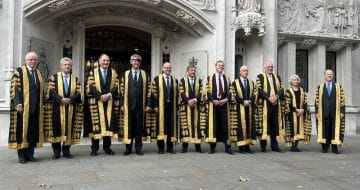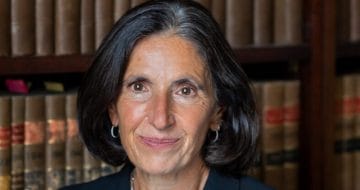Top judge optimistic about tackling hurdles ahead

The bells of Westminster Abbey chime softly through the Supreme Court, a melodic reminder of its historic place in the heart of Parliament Square. Inside her office, Lady Rose gestures toward her collection of ceramic teapots, neatly arranged on shelves. “They’re mostly by British studio potters,” she says with a smile. “The teapot is the ultimate vessel. It’s very challenging to make, technically, and also a way for potters to express their aesthetic in all sorts of weird and wonderful ways.” Her collection is as much a testament to her appreciation for craftsmanship as her enduring curiosity — traits mirrored throughout her career.
Lady Rose’s path to the Supreme Court began far from these hallowed halls, in a North London comprehensive school in Brent. Her father, a refugee from Nazi Germany, instilled in her a love for education. “Both my parents were graduates — my father in economics and my mother in foreign languages,” she recalls. “Like many Jewish families, they believed education was the way forward.” Initially, her parents hoped to send her to a private school, but Lady Rose found success at her local comprehensive. “They put me in for the entrance exam for a very posh private school, and I failed,” she says matter-of-factly. “But I didn’t let it hold me back. The comprehensive was very good to all three of us.”
Encouraged by her parents, she aimed for Cambridge, where she read law at Newnham College. Later, she completed the BCL at Oxford’s Brasenose College. “I decided from quite an early age that I wanted to be a barrister,” she says. “There were no lawyers in the family, so I’m not quite sure where the idea came from. If I’d known back then what I know now, I might have studied something else — but I did enjoy law as an academic subject.”
Her enthusiasm for legal history has endured. “I’ve always loved reading old cases,” she says. “There’s something wonderful about revisiting judgments from the 19th or early 20th century and seeing how the same legal problems recur. You feel part of a continuum of lawyers and judges grappling with these questions.” Her love for the law from an early age echoed throughout our conversation. “I always love the human drama of the cases,” she notes candidly. “I think in the common law tradition, we’re very lucky that the writing style of the judgments is so storytelling. This is one of the many reasons that I fell in love with the law, and I kept that delight in it throughout my career.”
Lady Rose began her legal life at Monckton Chambers, specialising in competition law. But the transition to life at the bar wasn’t without its challenges. As the first woman taken on by her chambers, she was acutely aware of her position. “I couldn’t help but be conscious of the fact I was the only woman,” she says. “I spent a lot of time questioning whether what I said, or what people said to me, would have been different if I were a man. It’s a very exhausting way to go through life.”
Winning the confidence of her colleagues took time, but it was transformative. “Once I started to be successful, I realised that people trusted me, and I didn’t need to question every interaction anymore,” she reflects. Mentorship was critical in this process. “Some of my colleagues were particularly keen to support me, perhaps because they felt it was about time there was a woman in chambers.” Still, there were challenges. “A couple of senior members of chambers never worked with me, and I can only assume they weren’t prepared to have me as their junior. But others were incredibly supportive and became great mentors.”
A turning point came in an unassuming moment by the office kettle. “I was making tea in the chambers’ annex and saw a senior colleague wrestling with a big case. I thought about offering him a cup but hesitated — would that reinforce stereotypes?” She ultimately decided to act. “I thought, he probably would really appreciate a cup of tea, and it’s a kind thing to do. If it only occurred to me because I’m a woman, well, so what?” The gesture became a lesson in authenticity. “Do not try and behave in a way which is inauthentic simply because you think that people will take a certain view. You have to be yourself. If you have talents, people will recognise them.”
Despite her growing expertise in competition law, Lady Rose began to feel constrained by life at the bar. “I enjoyed being a member of chambers. I liked the work very much. However, after 10 years, I had become entirely specialised in competition law, and although I really enjoyed it, I didn’t relish the prospect of another 20 to 25 years of the same,” she reflects. “I realised secondly, that I really didn’t like to advocate — and this is a disadvantage all around barrister!” She laughs. “I realised I didn’t want to live my life thinking, ‘In three weeks’ time or three months’ time, I’ve got something looming that I’m dreading.’” Her decision to leave the bar was rare at the time. “It came as a shock to people,” she says. “But I knew it was the right move.”
She joined the government legal service, a transition that allowed her to rediscover her love for the law. “It wasn’t the law that was the problem — I love the law. It was being a barrister that wasn’t right for me.” At the Treasury, she worked on the landmark Financial Services and Markets Act 2000. Later, at the Ministry of Defence, her focus shifted to international law during the Iraq War. “One day, you’re reading the Geneva Conventions, learning a whole new area of law. It teaches you that legal skills are more adaptable than you might think.”
These roles prepared her well for the judiciary. “The civil service teaches you to think broadly,” she explains. “You’re constantly considering how laws will affect future scenarios, which is very much the mindset of a judge.”
In 2021, Lady Rose was appointed to the Supreme Court, a moment she describes with characteristic humility. “Taking the judicial oath is always very moving,” she says. “It really brings home the responsibility of the role.” The ceremony, held during the pandemic, was smaller than usual but no less significant. “There’s that contrast — the solemnity of the oath, and the warm, humorous speech from the court president. It was a wonderful day.”
Now one of the most senior judges in the country, Lady Rose is keenly aware of the challenges facing the judiciary, particularly around diversity. Reflecting on the slow pace of change, she notes, “When I was called to the bar in 1984, half of those qualifying were women. Everyone assumed that within 20 years, half of QCs and judges would be women too. That clearly hasn’t happened.” The reasons, she suggests, are systemic. “The professional world still doesn’t make it easy to combine family responsibilities with full-time work.”
Despite the challenges, she remains hopeful. “The court’s attitude has shifted,” she says, pointing to initiatives like Bridging the Bar, which connects underrepresented groups with opportunities in the judiciary. “It’s about demystifying what we do and encouraging people to think about a judicial career.” For aspiring lawyers, Lady Rose’s advice is pragmatic. “Plan your career, but don’t worry that you’ll be stuck doing what you start with,” she says. Her own trajectory, from the bar to the civil service and then the Supreme Court, illustrates the value of flexibility. “There’s so much variety in the legal profession. Keep an open mind.”
I ask her to cast her mind back to an 18-year-old Vivien Rose, studying in the antiquated halls of Cambridge. Did she imagine she would reach such dizzying heights in the legal world? “I suppose some things have turned out as I expected. Other things not at all.” She pauses, reflecting. “I’ve always been ambitious and aimed to reach the top of any organisation I’ve been in. Whether I truly believed I’d get here, I’m not sure — but it was always my ambition.”
As the conversation winds down, the bells of Westminster chime again, marking another hour in this historic corner of London. Lady Rose glances at her teapots, each one a blend of function and artistry. “Each one tells a story,” she says. It’s a sentiment that seems to encapsulate her own career — a story of ambition, adaptability, and an enduring love for the law.
 (
( (
(

